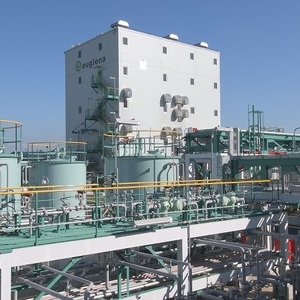Chevron Lummus Global announces startup of Euglena biofuels unit

Photo: Euglena Co. Ltd.
July 21, 2020
BY Chevron Lummus Global
Chevron Lummus Global and Applied Research Associates Inc. announced the successful startup of Euglena Co. Ltd.’s integrated Biofuels Isoconversion unit in Yokohama, Japan.
The 5 barrel per day, first-of-its-kind demonstration unit employs the Biofuels Isoconversion technology, jointly developed by CLG and ARA, to produce renewable jet fuel and renewable diesel out of an algae oil blend and waste vegetable oil.
Euglena Co. has successfully started up the demo unit in 2020, and its renewable diesel products have met all specifications of the Japanese standard of diesel fuel, JIS K2204. It has started supplying renewable diesel to local bus services for passenger transportation in Japan. Euglena Co. also plans to produce a renewable jet fuel that meets the ASTM D7566 Annex 6 specifications and supply it to commercial flights in Japan.
Biofuels Isoconversion technology consists of hydrothermal conversion and hydroprocessing operations that convert waste fats, oils and greases into jet fuel and diesel that are virtually indistinguishable from their petroleum counterparts. This will result in more than 80 percent reductions in lifecycle greenhouse gas emissions compared to petroleum, once it is commercialized. ReadiJet and ReadiDiesel, produced from the Biofuels Isoconversion technology, contain a uniform distribution of all hydrocarbon types observed in petroleum fuels, including aromatic, cycloparaffin, isoparaffin and normal paraffin compounds, and are able to be directly blended with petroleum fuels.
ASTM International has approved the new production pathway for sustainable aviation fuel (SAF) called “Catalytic Hydrothermolysis Jet,” or CHJ. Euglena Co. intends to deliver CHJ for commercial flights in the coming years through the use of the Biofuels Isoconversion technology.
“CLG is proud to be a part of the successful demonstration of the Biofuels Isoconversion technology at Euglena Co. and looks forward to implementing it at larger scale at several other locations around the world,” said Thad Sauvain, CLG’s director of global sales and licensing.
Chuck Red, ARA’s vice president of fuels development, said, “We are excited to see Euglena Co. take this meaningful step forward in its bold quest to become a leader in the production of low carbon intensity sustainable aviation fuel from algae and waste fats, oils and greases.”
Advertisement
Advertisement
Advertisement
Advertisement
Related Stories
Imperial Oil Ltd. on Aug. 1 confirmed it has completed construction and commissioning of its renewable diesel project at the Strathcona refinery near Edmonton, Alberta. The facility began producing renewable diesel in July.
PBF Energy Inc. on July 31 announced the St. Bernard Renewables facility averaged approximately 14,200 barrels per day of renewable diesel production during the second quarter of 2025. Production is expected to expand in Q3.
LG Chem and Enilive have taken a major step toward biofuels growth by breaking ground on Korea’s first hydrotreated vegetable oil (HVO) and sustainable aviation fuel (SAF) production plant in LG Chem’s Daesan Chemical Complex.
Avfuel Corp., the leading independent supplier of aviation fuel and services, is expanding its sustainable aviation fuel (SAF) footprint with the addition of a new, strategic supply point in Denver, Colorado—the first of its kind in the region.
CVR Energy Inc. on July 30 reported its renewables segment achieved increased throughput during Q2 despite unplanned downtime but reported a net loss of $11 million. The company expects to retroactively claim the 45Z credit for volumes produced.
Upcoming Events










